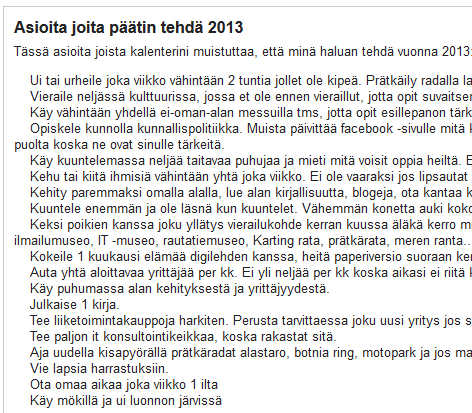
Harvard Grant Study:ssä havaittiin 5 tärkeintä tekijää, joista onnellinen elämä koostuu.
Tässäpä resepti onnelliseen elämään:
Ripaus rakkautta, merkityksellistä työtä ja kasvamista keittiöpsykologien oppeja noudattaen = onnellisuus.
1. Rakkaus, mitä ikinä tarkoittaakin elämässäsi, on tärkeintä
Tärkeintä on rakkaus. Tämä vanha viisaus pitää paikkansa: Tutkimuksen mukaan rakkaus on onnellisuuden avain ja tie täyteläiseen elämään. Harvardin psykiatri George Vaillantin mukaan rakkaudella on kaksi puolta:
a) Rakkaus
b) Opettele elämään elämää, jossa et karkota pois rakkautta
"Onnellisuus on vaunut, joita hevonen vetää. Hevonen on rakkaus."
2. Älä pidä tärkeimpänä rahaa äläkä valtaa
Vallalla, uralla ja varallisuudella on jotain merkitystä onnellisuuden kanssa, mutta ne ovat kuitenkin vain osa elämän kokonaisuudessa. Silloin tällöin ihmisen elämässä raha ja valta nousevat pintaan ja varsinkin julkkisten menestystä ja onnellisuutta arvostellaan rahallisen menestyksen tai aseman perusteella. Todellisuudessa, kun katsomme elämää kokonaisuutena, niin tärkeintä ei ole valta eikä raha.
3. Hyväksy, että sinullakin on mahdollisuus tulla onnelliseksi. Lähtökohdilla ei ole merkitystä.
Tämä on tärkeä havainto. Historia ei määrittele sitä, miten onnellisia meistä tulee. Eräs tutkimukseen osallistuneista henkilöistä aloitti elämänsä todella haastavista tilanteista ja yritti jopa itsemurhaa. Epäonnistui siinäkin. Yllätys yllätys: loppujen lopuksi hänestä tuli yksi onnellisimmista koehenkilöistä. Miten se voi olla mahdollista? Tutkijat havaitsivat, että hän käytti koko elämänsä siihen, että hän halusi ymmärtää ja jakaa paremmin ja enemmän rakkautta.
4. Mikä boogie? Sillä on merkitystä. Olet onnellinen, jos olet töissä hyvällä sykkeellä ja rakastat sitä mitä teet. Sama pätee ihmissuhteisiin ja muihin elämän osa-alueisiin.
Tutkimuksen mukaan suurin mielihyvän lähde elämässä ovat ihmissuhteet. Duunissa rahan tai maineen sijasta etusijalle nousee itse hommista saatu tyydytys. Olen kirjassanikin todennut tämän saman, mitä tutkimus nyt vahvistaa: Jos sä teet jotain hommaa 8 tuntia joka päivä, sun on parasta nauttia siitä. Sama pätee loppuihin tunteihin. Nauti koti-elämästä. Nauti yöelämästä. Onnellisuus, ja elämän eri osa-alueista nauttiminen ovat synkronissa keskenään. Aika loogista. Mitä enemmän nautit elämästäsi ja saat mielihyvää kokonaisvaltaisesti, niin sitä onnellisempi olet. Haasteet työssä, arvostus parisuhteessa, onnistumisen elämykset, niistä on hyvä elämä tehty.
Case: 158: “What I am doing is not work; it is fun. I know what real work is like.”

5. Haasteet ja niiden myötä opitut asiat lisäävät onnellisuutta.
"Kasva isoksi, älä aikuiseksi" -lause ei sittenkään päde. Aikuisuus on sitä, että absoluuttinen muuttuu suhteelliseksi. Epäkypsä muuttuu kypsäksi ja huomioi muutkin ihmiset. Narsistista tulee toiset huomioiva (I recognize I still have work in progress). Kasvaminen vaikuttaa myös siihen, kuinka selviydyt elämäsi haasteista. Meillä jokaisella on selviytymismekanismeja ja keinoja, joilla suhtaudumme vastoinkäymisiin. Esimerkiksi voit olla onnellisempi, jos osaat purkaa argessiot sporttailemalla tappelun sijasta. Elämäntaitojen hallitsemisella on suuri merkitys onnellisuudessa ja hyvinvoinnissa. Mitä laajemmin osaat ymmärtää ihmisyyttä ja mitä monipuolisemmin osaat huomioida ja hyväksyä muut, sitä onnellisempi olet.
Onnellisuutta päivääsi!
Ilkka O. Lavas
sarjayrittäjä
Lähteet:
- http://link.brightcove.com/services/player/bcpid1460906593?bctid=22804415001
- Jos sun pokka kestää, niin lue tämä: http://www.theatlantic.com/magazine/archive/2009/06/what-makes-us-happy/307439/
- http://www.huffingtonpost.com/2013/08/11/how-this-harvard-psycholo_n_3727229.html
- http://www.amazon.com/exec/obidos/ISBN=159420148X/theatlanticmonthA/ref=nosim/
pps. Meitsin muistiinpanot:
"But it turned out that the lives were too big, too weird, too full of subtleties and contradictions to fit any easy conception of “successful living.”"
"Freud dismissed the very idea of “normality” as “an ideal fiction” and famously remarked that he hoped to transform “hysterical misery into common unhappiness.”
"“Neurotic” defenses are common in “normal” people. These include intellectualization (mutating the primal stuff of life into objects of formal thought); dissociation (intense, often brief, removal from one’s feelings); and repression, which, Vaillant says, can involve “seemingly inexplicable naïveté, memory lapse, or failure to acknowledge input from a selected sense organ.” The healthiest, or “mature,” adaptations include altruism, humor, anticipation (looking ahead and planning for future discomfort), suppression (a conscious decision to postpone attention to an impulse or conflict, to be addressed in good time), and sublimation (finding outlets for feelings, like putting aggression into sport, or lust into courtship)."
Karmeita stooreja: "When his sister died, he sent her autopsy report to the Grant Study office, with a cool note saying that he expected it would be “an item of news.” He reported another family death this way: “I received an inheritance from my mother.” "
“What I am doing is not work; it is fun. I know what real work is like.”
"The predictive importance of childhood temperament also diminishes over time: shy, anxious kids tend to do poorly in young adulthood, but by age 70, are just as likely as the outgoing kids to be “happy-well.”"
"“The happiness books say, ‘Try happiness. You’ll like it a lot more than misery’—which is perfectly true,” he told them. But why, he asked, do people tell psychologists they’d cross the street to avoid someone who had given them a compliment the previous day?
In fact, Vaillant went on, positive emotions make us more vulnerable than negative ones. One reason is that they’re future-oriented. Fear and sadness have immediate payoffs—protecting us from attack or attracting resources at times of distress. Gratitude and joy, over time, will yield better health and deeper connections—but in the short term actually put us at risk. That’s because, while negative emotions tend to be insulating, positive emotions expose us to the common elements of rejection and heartbreak."
"But why do countries with the highest self-reports of subjective well-being also yield the most suicides? How is it that children are often found to be a source of “negative affect” (sadness, anger)—yet people identify children as their greatest source of pleasure?
The questions are unresolved, in large part because of method. The psychologist Ed Diener, at the University of Illinois, has helped lay the empirical foundation for positive psychology, drawing most recently on data from the Gallup World Poll, which interviewed a representative sample of 360,000 people from 145 countries. “You can say a lot of general things from these data that you could never say before,” Diener says. “But many of them are relatively shallow. People who go to church report more joy. But if you ask why, we don’t know."
“Their lives were too human for science, too beautiful for numbers, too sad for diagnosis and too immortal for bound journals.)"
“I sometimes wondered if another motivation for the study of these lives,” says Henry Vaillant, was “to learn how to live his own life right. As if by interviewing all these very successful people, he would get the knack. And of course in many ways, he has the knack.”
"Vaillant’s own work provides an uncanny description of his strengths and struggles. “On the bright side,” he has written, “reaction formation allows us to care for someone else when we wish to be cared for ourselves.” But in intimate relationships, he continued, the defense “rarely leads to happiness for either party.”
“with the passage of years, old wars become more adventurous and less dangerous.”





















